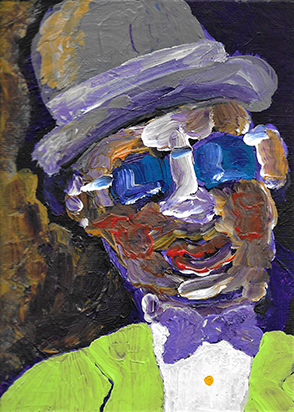Stuart Bartow
Scarecrows
They used to sport fedoras but fashions change.
No top hat, this one wears a baseball cap,
shirt plaid like mine. Maybe I too
will learn to stay still as the clouds
drift by and the moon
goes and comes, will learn
the wind’s old language,
learn to be silent, head full of air
and starfall. Things do light on me
at times, leaves, a dragonfly
that perceives my brotherhood
to you. Still, scarecrow, you can show us
how silence can dance, and destinies
might pleach, why you were planted here
not to scare birds, but in whimsy.
Lobsters
I miss eating them, but not much.
We’ve yet to learn the spectrum of sentience,
but surely there’s light in lobsters
who travel in caravans on the ocean floor
and release their little ones from traps
set by lobster men. Lobstermen, beings
from a faraway planet, come here
to visit the lobsters of planet earth,
a related species. What might they think of us
who boil their cousins alive? In Teenagers
from Outer Space, the aliens,
1959 teenagers, come to earth with a lobster
that earth’s atmosphere causes to grow
into a giant that eats people.
At the supermarket seafood section
I always pause before the tank, hear those
rubber-banded claws tapping the glass,
a distress call to an ocean far from here.Look what the wind blew in people sometimes say
to me when I arrive out of the blue
or into it, as though my arrivals
were random and I unaware of all
I might be doing, destinations nothing
to do with destiny. Look what the wind
blew in, as if gravity played loose with me,
a blithe spirit sailing through the door,
paper trash with a poem scribbled in
a dead language, or a future one,
even 21st century English.
So much better than look what the cat dragged in,
for who would choose dead or bedraggled
when you could open your arms like a crow
on a scarecrow and strike into the wind.
Stuart Bartow teaches writing and literature at SUNY Adirondack, and also chairs the Battenkill Conservancy, an environmental non-profit. His Teaching Trout to Talk: the Zen of Small Stream Fly Fishing, received the non-fiction award from the Adirondack Center for Writing, and a previous collection of poems, Einstein’s Lawn, is also published by Dos Madres.
